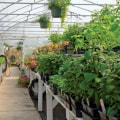You could even say that horticulture focuses on sustainability on a much larger scale than gardening. Essentially, horticulturists are the producers and suppliers of the plants, while gardeners are strictly the consumers. Gardening is simply defined as plant growth. People practice gardening as their hobby, but sometimes it's even done for commercial purposes.
We are all aware of the fact that plants give us oxygen to breathe, so almost every house has some kind of plants. And, therefore, this is called gardening. We love seeing the greenery, even if we stay in a compact apartment. The best hobby people usually choose is gardening.
At any age, such as in older people, as well as a child, you can practice gardening. However, there are several fundamental differences with these plant-based scientific studies. Horticulture is the applied science of gardening, while botanists study plant theory. Let's take a look at each discipline in a little more detail so that you have a full understanding of each of them and what they do.
Both make plants and gardening their life's work, but they approach it in different ways, which means you need to decide which one suits you best. These can be wall-mounted plastic garden pots that form the wall or vertical garden bags that also attach to the wall. Ask Any Difference editorial staff is a team of experts in the field of Difference Between topics and is led by Sandeep Bhandari, Piyush Yadav and Chara Yadav. We are all familiar with the term gardening and, in one way or another, almost all people are planters.
Recently, while walking in the garden, I was called that nickname again, and this time it made me wonder if gardening and horticulture are the same or not. As you can see, horticulture and gardening are closely related, but because horticulture is generally done on a larger scale, it made me more aware of my status as a “horticulturist”. Some excellent examples of horticulture include landscaping, certain types of gardening, growing food, growing fiber and fuel, and arboriculture (tree care). Some advantages that can be noticed when gardening are that it reduces the carbon footprint, helps reduce stress levels, increases oxygen production and keeps the gardener active and happy.
The more you take the time out of your usual problems and head to the garden, the more relaxed you can expect to be. You'll learn a lot about plants, and almost every botanist has a private garden, but planting may not be part of their job. Different types of cultivation, such as organic gardening, are used to highlight the differences in approach between gardening and horticulture, while gardening styles or practices such as yard gardening or plot gardening are used to show that while gardeners are the consumers of products and services, Professional horticulturists are not only providers of the products and services, but they have also developed the technology to make style or practice possible. Techniques such as soil cultivation, propagation and pruning are examined for differences in approach and scale, and the chapter concludes with examples of the range of scientific efforts that underpin plant breeding, greenhouse production and growing media.






